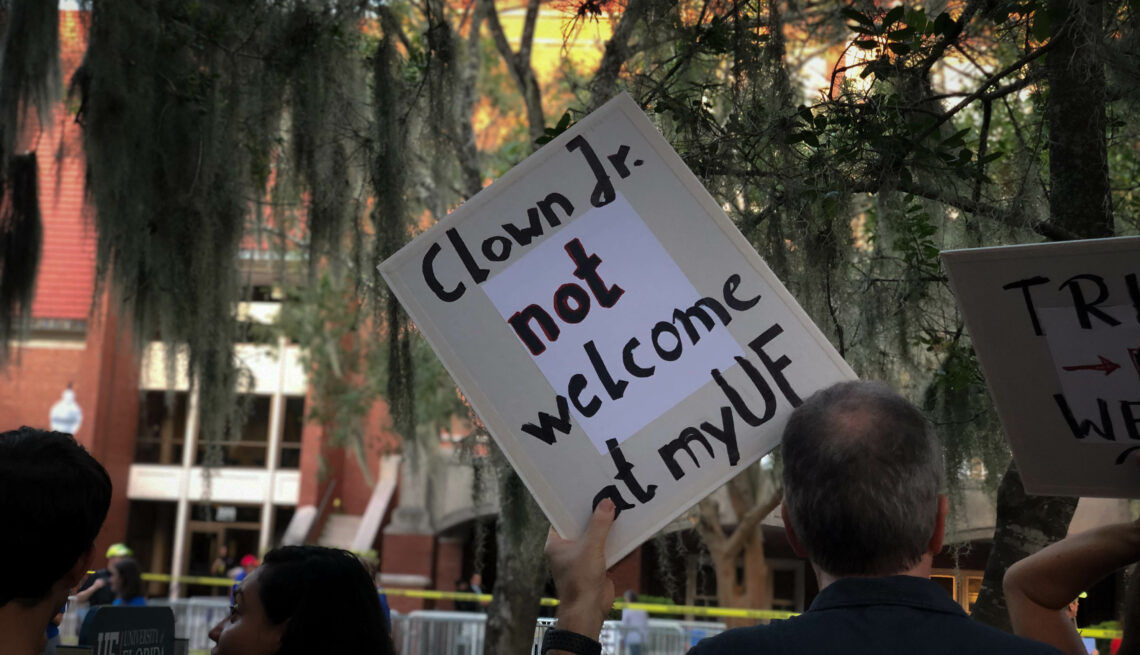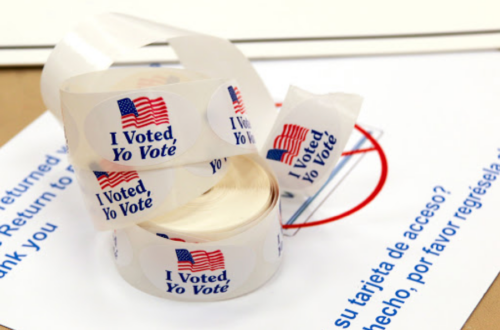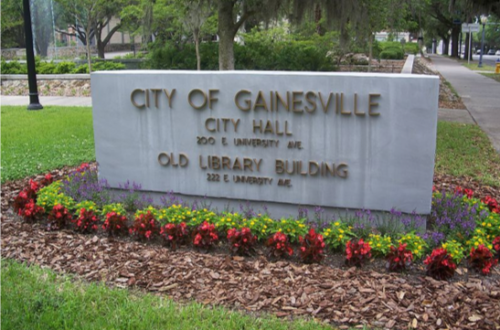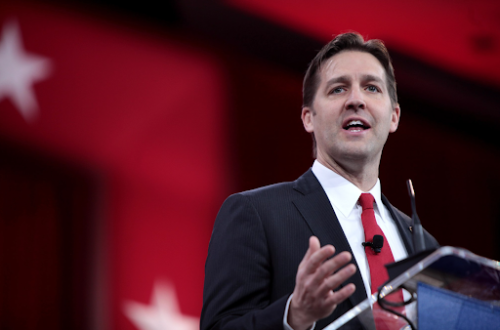A breeze blew along Newell Drive, the kind that teems with autumn weather; pastoral, warm, inviting. Golden rays of Floridian sunset flashed through the cracks of crimson-brick buildings and southern magnolias, casting its light on the old, the young and the ambitious.
And then came the distant sound of chanting; the clinking of cowbells; the hissing roll of snare drums.
The University of Florida had not seen a crowd like this in quite some time; students and members of the community were gathered to protest, or support, the arrival of Donald J. Trump Jr. and Kimberly Guilfoyle on Oct. 10. They were paid $50,000 for the event.
The event began at 7 p.m., but the protestors found their spots on the lawn as early as 5 p.m.
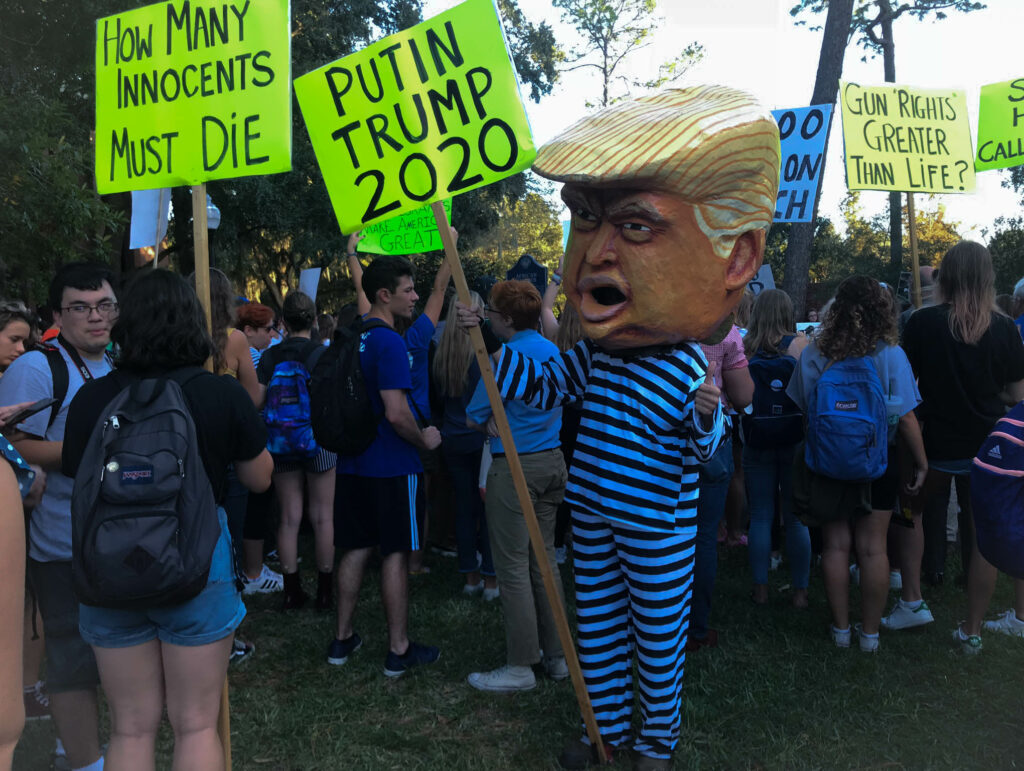
“I think it’s really important to show up for all the protests against this administration that is so corrupt,” said a retired woman from Tallahassee wearing a large Donald Trump head.
Many attending the speaking event spoke of a support for free speech, frustration at popular misrepresentation of the president and the perceived hypocrisy of the protesters.
“What they’re saying I almost agree with. They’re like, ‘no KKK,’ ‘no fascism,’ all that stuff, ‘stand up for women’s rights.’ I believe in all that stuff,” Michael Wyatt, a freshman at Santa Fe College studying construction management, said.
Wyatt said he was supportive of the event, but he also advocates for free speech in every aspect and that the protestors have every right to protest.
Among the chanting, profanity could be heard, and some of it was directed at a specific visitor to the event whom many recognized.
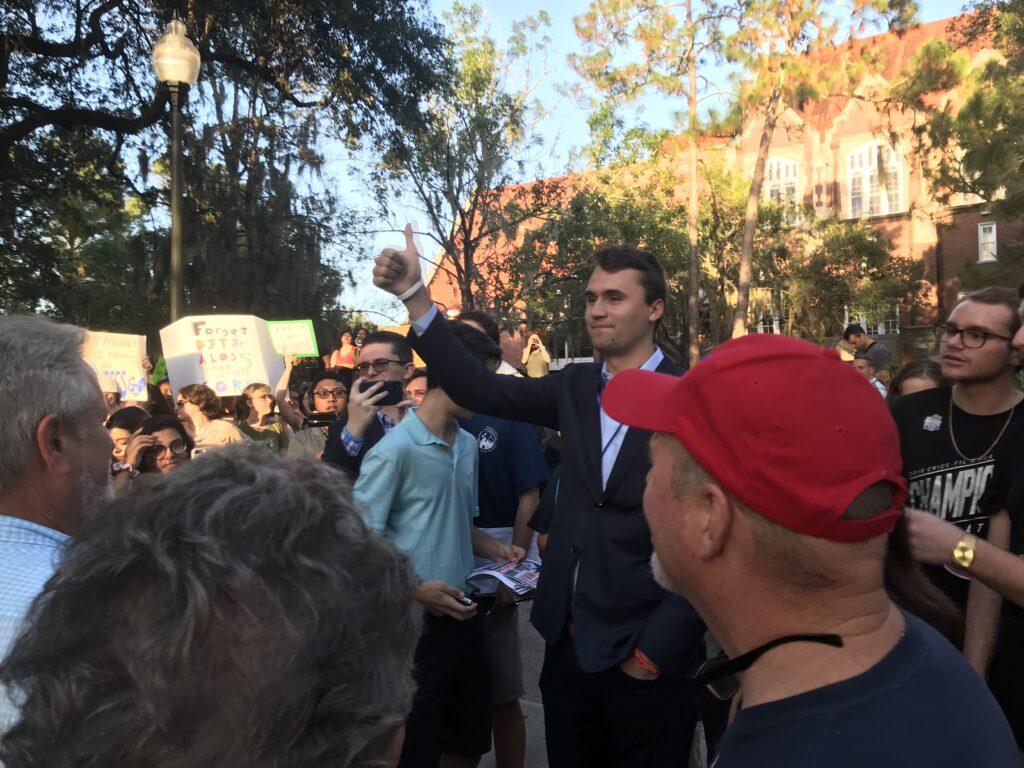
Charlie Kirk, the founder of the conservative group Turning Point USA, was also in attendance. He currently serves as the CEO of TPUSA as well as the chairman of Students for Trump.
In response to whether he believes that $50,000 is too big a sum of money for SG to spend on a controversial speaker in wake of past events, Kirk told the Florida Political Review, “No, he’s not controversial… The answer is no. These people [the protestors] are controversial.”
The protest also drew many student groups and broader organizations from various points on the political spectrum.
Among the protesters were the College Democrats, Dream Defenders and National Women’s Liberation, while College Republicans, Alachua County Republicans and Culture Wars supported the attendees of the speaking event.
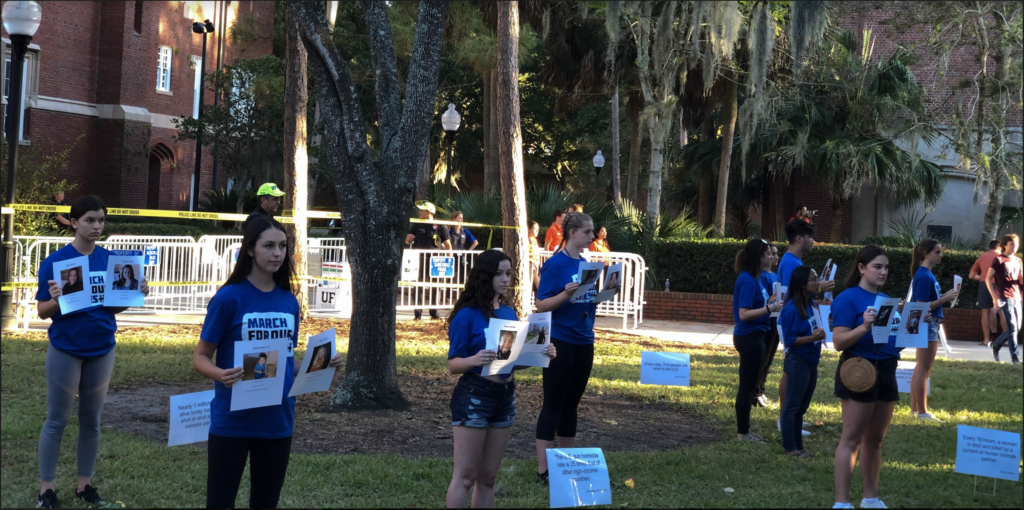
Engulfed in the sea of protests and passionate rallying, one organization spoke not with their voices, but with their actions. March for Our Lives, a student-led advocacy group against gun-violence, presented a silent yet stoic demonstration of past victims of gun-violence in front of the entrance to the event.
About one week prior, UF’s ACCENT Speaker Bureau, funded by Student Government, announced Trump Jr. and Guilfoyle would be the next dual campus speakers. In addition to speaking, Trump Jr. would promote his new book “Triggered: How the Left Thrives on Hate and Wants to Silence Us.”
Concerned with what was viewed as a misuse of student fees, student senators sponsored a resolution condemning the act and sent it to the Judiciary Committee, a standard procedure before a piece of legislation hits the Senate floor.
The Judiciary Committee, chaired by Senate Majority Leader Branden Pearson, met twice before the Oct. 8 meeting. Both times, the committee did not meet quorum. The resolution did not reach the Senate floor.
Unscathed by the setback, protest organizers Emily Hyden and Jovanna Liuzzo took matters into their own hands and went directly to the UF administration, the only authority that can supersede SG.
In a video released on the Facebook event “Protest: Say NO to Donald Trump Jr. and Kimberly Guilfoyle” on Oct. 9, Hyden and Liuzzo attempted to negotiate with University President Kent Fuchs, stipulating that if Fuchs did not use his authority as President to cancel the event, student resources such as the Counseling and Wellness Center must be extended, and students who did not feel safe attending classes have the absences be excused.
Fuchs responded, “You all know who invited him, right? Your people that the students elected.”
However, this is not the truth. While most Senate seats and the executive ticket are voted on by the student body at-large, some positions, such as the chair of the ACCENT Speaker Bureau, are appointed by the Student Body President, currently held by Michael Murphy.
Dan Murphy, a former UF lobbyist and father of Michael Murphy, has already maxed out donations to Trump’s re-election campaign. Murphy also met with Ted Cruz and Trump Jr. back in August.
“I think this is really telling of what the student body supports, and it’s not what our student body president claims we support,” Hunter Hurley, a sophomore political science student at UF said.
The University Auditorium drew over a thousand protestors who marched to the back of the building, while attendees of the speech gathered in the front.
“Get up, get down, Michael Murphy, you’re a clown!”
“GIve our money back. Lock him up.”
“What do we want? Impeachment. When do we want it? Now.”
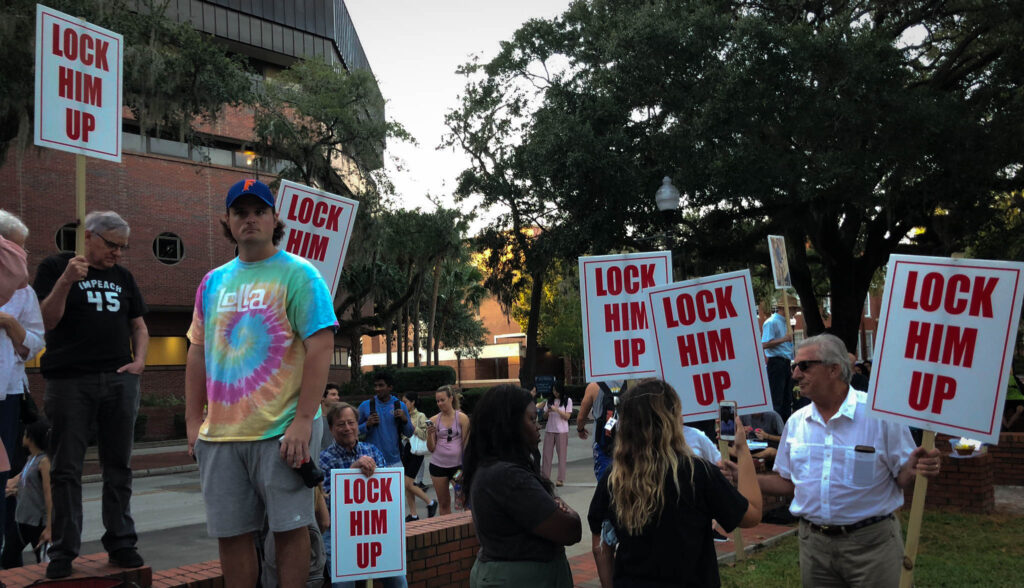
Then the protesters moved to the front of the building.
Much of the protesters’ fury stemmed from the idea that this is was student-funded campaign stop. UF students pay $19.06 per credit hour towards funding Student Government.
Protester Christina Pugliese, a telecommunications major and the Outreach Director for UF College Democrats, said, “I am so angry that Donald Trump Jr. is coming here, treating us like a campaign trail stop, and by using our money as students, that’s not okay. I never thought that my money would go into the Trump election campaign.”
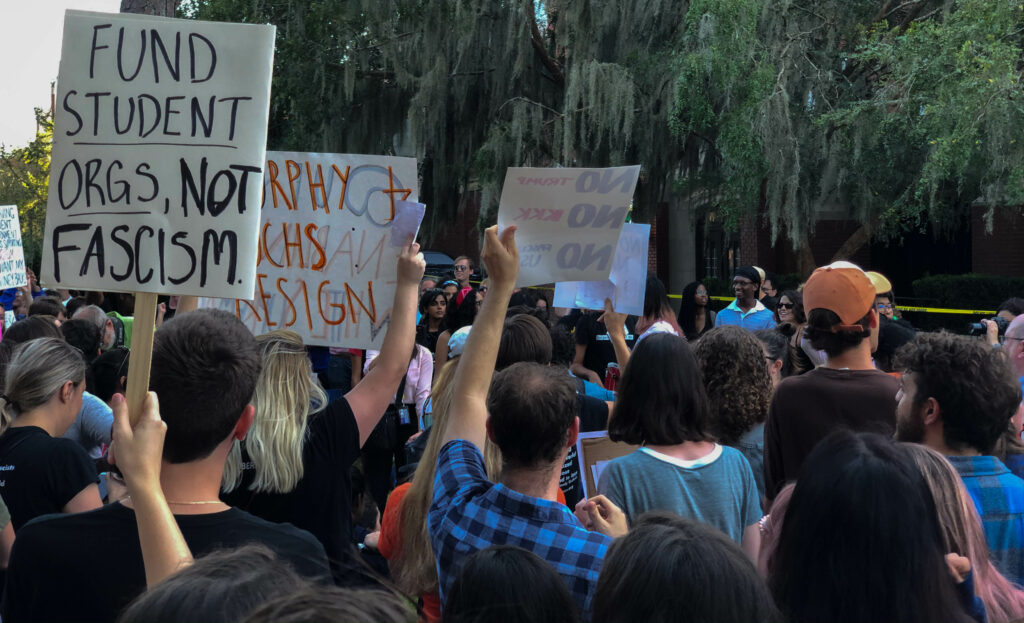
Susette Oñate, a senior and a member of Democracy Matters, said, “I don’t think they should be using our student fees for a lot, especially after mismanagement of Student Government’s budget actually prompted them to cut a lot of the funding that they provide for multicultural organizations.”
The sense of disenchantment on both sides was palpable, brought to the surface by the presence of an igniting figure. Regardless, some students protesting or attending the speech were seeking to learn more about themselves, and find unity in politics.
Michael Leventhal, a freshman political science student at UF, said he wanted to study political science to define his views.
“I could say I take pride in knowing that there’s a lot of people who want to explicitly show how passionate they are towards their views on politics,” he said.
Marlon Bruce, who is studying political science and economics said he didn’t agree with the protestors and that they misrepresent the president.
“If they were to put down the yelling they would actually find out that we have a lot more in common than they think.”
Editors note: The authors of this article are Christopher Stansel, Andy Shodell, Jasmin Du Bois, and Jason Silveira
